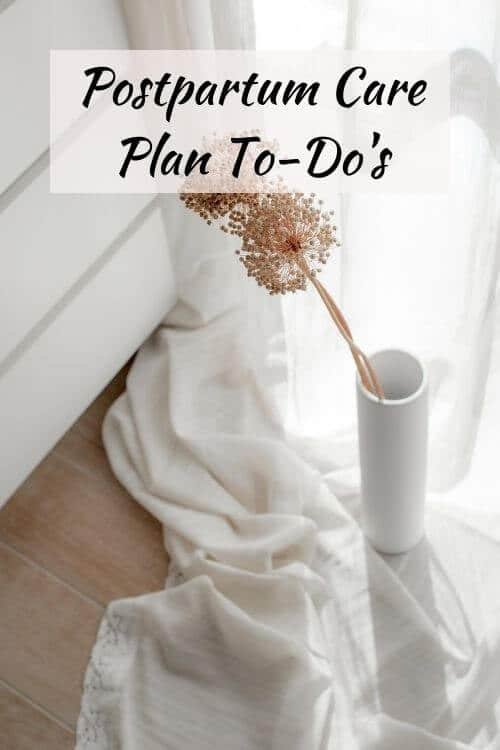Devising a postpartum care plan? Be sure to put these 7 things on your to-do list for a guaranteed comfortable recovery.

After the birth of your baby, it’ll be time for you to bask in some highly anticipated and much-deserved recuperation time. Having a postpartum care plan will help you establish a safe and comfortable recovery.
You can put some different methods into action to help you prepare to indulge in as much R&R as humanly possible.
Here are some of the things I recommend you do to aid in your postpartum recovery that helped me get through mine.
This post is all about postpartum care plan to-do’s.
This post may contain affiliate links, which means I’ll receive a commission if you purchase through my link, at no extra cost to you. Please read the full disclosure here.
Essentials To Include In Your Postpartum Care Plan:
1. Use disposable underwear instead of pads

After you give birth to your baby, you are going to continue to bleed for a while.
That bleeding can and will go on for about 3 weeks – 6 weeks on average. In the beginning, it will be a rather heavy flow that pads are just not very ideal for.
I don’t know about you, but I’ve never had a pad give me the full coverage that all the commercials go on about.
I’ve never used a pad that actually resisted leaks. Someway, somehow the pad always gets bunched between your legs, and the sides of the underwear get exposed and leaked on.
I personally preferred to use disposable underwear (instead of pads) for all of my postpartum experiences.
With disposable underwear, you slide it on like regular undies, you can let your flow happen without dealing with bunching or readjusting pads, and when it’s time to change it, you can just dispose of the whole thing, grab a new one, and never ruin another pair of panties. Or, in this case, underwear – panties are for a whole different occasion.
Once the bleeding has lightened up substantially, then pads can once again be a viable option.
2. Cleanse lady parts with a squirt bottle instead of wipes (or wasting TP)

After using the bathroom, don’t waste time wiping yourself down with wipes or toilet paper.
It’ll be a bit messy, and it’s not going to wipe clean or at least the semblance of clean you may like to see.
Instead, use a squirt bottle to rinse between your legs with warm water after changing pads (or disposable underwear) and bathroom breaks instead of wasting gobs of toilet paper trying to wipe yourself clean, which isn’t going to happen.
The hospital I gave birth at gave them to me, but it’ll be nice to have some if yours doesn’t.
3. Get pain relievers

You will more than likely experience lingering pains after the delivery of your child.
You’ll feel discomfort in your vaginal area, your tummy, and your lower back (to name a few).
You may have aches and pains that extend beyond this or aches and pains that don’t include all of these parts, but aches and pains of some kind are for sure a given.
I heard the doctors would prescribe pain medicine for you to take home, once upon a time. That was a thing of the past when I gave birth to my children.
I would recommend getting and taking some pain reliever that has been approved by your doctor as being safe and effective (and definitely check if it’s safe for your baby if you’re breastfeeding).
I personally used Tylenol. My doctor said it was safe for me and safe for my breastfed baby.
4. Use a heating pad

To further soothe any physical pain or discomfort you may be experiencing, make sure to have a good-quality heating pad.
The warmth will help relax sore, cramping muscles and joints and bring you some added comfort during your recuperation.
You can lay it across your tummy or on your back, or wherever you could use relief. I used to lay mine on top of my bed and lay my lower back on top of it or cradle it against my lower tummy.
Applying a heating pad to these areas will feel soothing as your body heals.
5. Stock up your home
You can greatly reduce the number of obligations and responsibilities on your plate by stocking up on groceries, household staples, and baby supplies before the birth of your baby.
This way, you can be assured that what you need is readily available for you, and you can keep your trips to a minimum.
Then try getting future orders for groceries, household staples, and baby supplies through delivery services.
Of course, Amazon is a great option for pretty much everything. Instacart is a great option for groceries if the store you typically shop at doesn’t offer delivery directly through them.
Try to have enough of a supply to comfortably get you through your time at home until you start ordering household supplies (and to hold you over while waiting for the deliveries to arrive).
6. Be sure to have comfortable clothing to relax and recoup in
When it comes to your postpartum recovery, you will want to make sure that you make yourself feel as comfortable as possible.
Anything you can do to aid in providing yourself relief and comfort is ideal.
So when you’re lounging around at home trying to rest, relax, and recuperate, or tending to the needs of your newborn baby, you will want to do so in some comfortable loungewear.
7. Sleep when the baby sleeps
When you give birth to your baby, especially if you’re a breastfeeding mom, the doctors and nurses will recommend that you feed your newborn 8-12 times per day.
This averages feeding your baby once every 2-3 hours (for the entire 24-hour day).
Your baby will have a tiny tummy and will initially need frequent feedings of small amounts of milk. My babies initially drank about 2 ounces of milk every 2-3 hours.
It’ll probably be a little while before your baby starts sleeping completely through the night.
It varies depending on the child. My firstborn started sleeping through the night at about 2-months-old, the second child at 17-months-old (yikes), and the third child at 6-months-old.
The point is, that the only way to try to get an adequate amount of sleep is by trying to sleep whenever the baby sleeps.
Otherwise, if you stay up all day and don’t go to bed until nighttime, you’re probably going to find yourself feeling pretty miserable and exhausted when your baby starts waking you up every 2-3 hours.
It’s also safer for the baby if you’re not sleep-deprived, so that way, you’ll be more patient, less irritable, and less accident-prone. Plus, being crazy sleep-deprived isn’t going to do much to aid in your recovery.
Now go ahead and put these tactics into action to better recoup and relax during your postpartum recovery phase, and I bet you’ll be so glad that you did. Happy recovering!






Leave a Reply